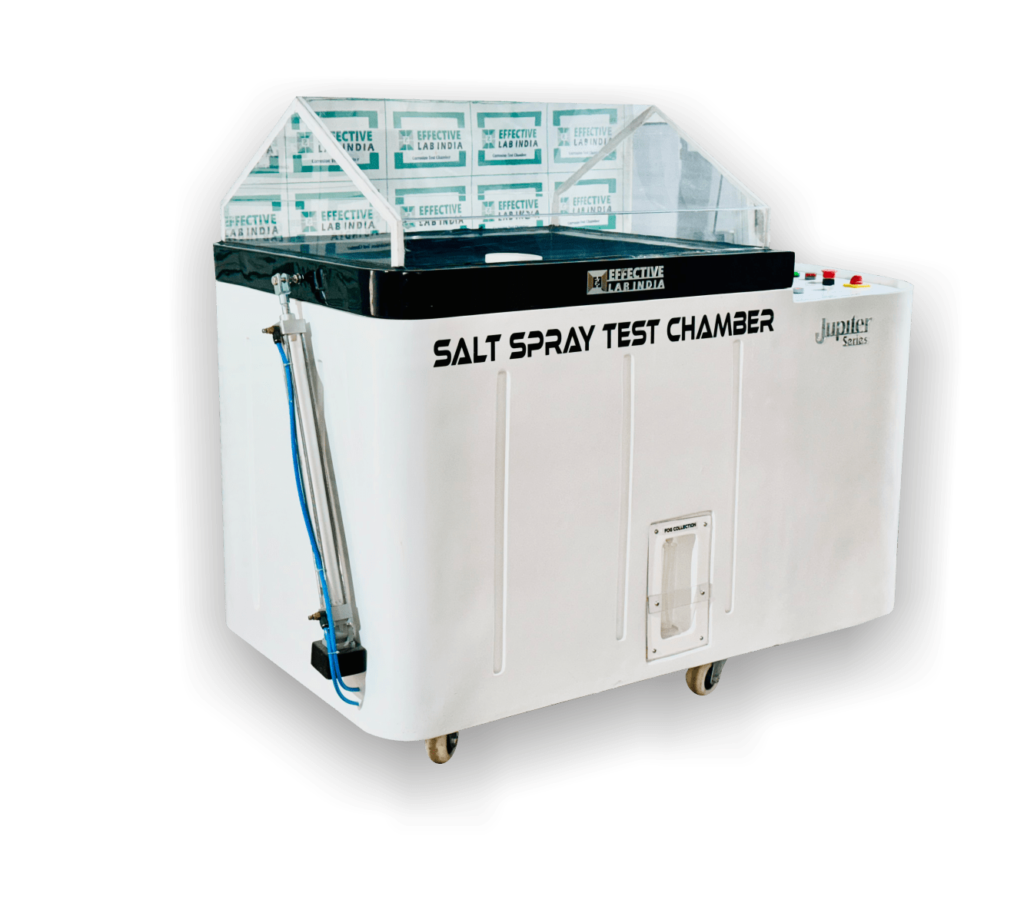SALT SPRAY CHAMBER - JUPITER SERIES
SALT SPRAY CHAMBER MANUFACTURERS
MODEL JUPITER SERIES
Salt spray chamber are vital in many industries. They test materials for durability and corrosion resistance. Of the top manufacturers, the best salt spray test machine is Laboratory Testing Instrument’s Jupiter Series. Its technology is innovative. These chambers, or salt fog corrosion chambers, have advanced features. They allow for thorough corrosion testing. They replicate harsh conditions to test materials and coatings.
These chambers speed up corrosion by creating a controlled, corrosive, saline environment. They provide great insights into material durability and performance. When buying, research salt spray test chamber manufacturer. This will get you the best price.
Salt Spray Test Chamber Working Presses
The Salt Spray Chamber – Jupiter Series, manufactured by Laboratory testing instruments, operates through a systematic process to fulfill its various uses across industries. Let’s delve into its working process
- Preparation– To create a corrosive environment, the chamber is prepared by filling the reservoir with a saline solution, typically consisting of sodium chloride dissolved in water.
- Specimen Placement– Test specimens, such as metal samples or coated products, are placed inside the chamber on racks or holders, ensuring proper exposure to the saline mist.
- Exposure The chamber is sealed, and the saline solution is atomized to create a fine mist, which is sprayed onto the test specimens. The specimens remain exposed to the salt fog for a predetermined period, simulating real-world corrosive conditions.
- Monitoring– Throughout the exposure period, the chamber’s controls monitor and maintain specific parameters such as temperature, humidity, and spray duration to ensure consistency and accuracy in testing conditions.
- Evaluation– After the designated exposure period, the test specimens are removed from the chamber, cleaned, and inspected for signs of corrosion or damage. Various analytical techniques may be employed to assess the extent of corrosion, such as visual inspection, mass loss measurement, or surface analysis.
- Data Analysis– Test results are analyzed to determine the materials’ corrosion resistance properties, including corrosion rate, pitting, or surface degradation. This data is crucial for evaluating the performance and durability of materials and coatings.
Uses
The Jupiter Series salt spray chamber serves multiple uses across industries:-
- Corrosion Resistance Testing-It evaluates the ability of materials and coatings to withstand corrosion, helping industries select suitable materials for manufacturing processes and ensure product longevity.
- Quality Control-Manufacturers use the chamber for quality control purposes to assess the quality and performance of products under corrosive conditions, ensuring compliance with industry standards and customer expectations.
- Research and Development– In R&D settings, the chamber aids in studying the corrosion behavior of materials and developing new coatings or treatments for enhanced corrosion resistance, contributing to product innovation and improvement.
- Material Selection– Engineers and designers utilize the chamber to compare the corrosion resistance of different materials and coatings, aiding in informed decision-making during material selection for specific applications.
- Regulatory Compliance– Industries subject to regulatory requirements for corrosion resistance, such as automotive and aerospace, use the chamber to demonstrate compliance with industry standards and regulations, ensuring product safety and reliability.
- Equipped with a user-friendly 7-inch TFT LCD color touchscreen interface for easy operation and monitoring.
- Capable of operating within a temperature range from ambient to 40°C, providing flexibility for various testing conditions.
- Maintains chamber temperature at 35°C ± 2°C, ensuring consistent and accurate testing conditions.
- Offers a least count of 0.1°C for chamber temperature, allowing precise adjustments and control.
- Provides ± 2°C repeatability for chamber temperature, ensuring reliable and consistent test results.
- Features a temperature range of 40°C to 49°C for the air saturator, maintaining optimal conditions for testing.
- Includes a built-in PID temperature controller for efficient and accurate temperature regulation.
- Incorporates a six-digit timer (hour meter) for precise timing control during testing procedures.
- Requires 15 A, 50 Hz, single-phase power supply operating at 220 V for efficient performance.
- Supports examination of air pressure ranging from 0.7 to 1.2 kg/cm³, allowing for comprehensive testing.
- Adjustable air regulator with a range of 0 to 30 psi, enabling fine-tuning of air pressure as per testing requirements.
- Available in various models including Jupiter – 250, Jupiter – 450, and Jupiter – 1000, each with different inner and outer dimensions to suit specific testing needs.
| Display | 7-inch TFT LCD color touchscreen with Human Machine Interface (HMI). | |
| Temperature Range | Test Chamber: Ambient to 40°C, with a precision of ± 2°C around 35°C. Air Saturator: Operates within the range of 40°C to 49°C. | |
| Temperature Control | · Least Count for Chamber Temperature: 0.1°C. · Repeatability of Chamber Temperature: ± 2°C. · Least Count for Air Saturators: 0.1°C. · Repeatability of Air Saturation Temperature: ± 2°C. | |
| Power | Requires 15 A, 50 Hz, single-phase power supply, operating at 220 V. | |
| Controller | Equipped with a built-in PID temperature controller for precise temperature regulation. | |
| Timer | Features a six-digit timer (hour meter) for accurate timing control. | |
| Test Air Pressure | The air pressure for testing ranges from 0.7 to 1.2 kg/cm³. | |
| Air Regulator | Adjustable from 0 to 30 psi for regulating air pressure. | |
| Models | ||
| 1 | Jupiter – 250 | |
| 2 | Jupiter – 450 | |
| 3 | Jupiter – 1000 | |
| (Inner Dimensions: 780x620x720 mm, | Outer Dimensions: 1540x1070x1300 mm) | |
| (Inner Dimensions: 950x700x720 mm, | Outer Dimensions: 1800x1250x1250 mm) | |
| (Inner Dimensions: 1500x960x710 mm, | Outer Dimensions: 2370x1400x1350 mm) | |
Get In Touch
FAQ's
Salt spray chambers are utilized for testing the corrosion resistance properties of metals. They are employed in various industries to assess the corrosion susceptibility of metal products under simulated corrosive environments.
The pH of a salt spray test typically ranges from 6.5 to 7.
A 5% NaCl (sodium chloride) solution is used in a salt spray test to create a highly corrosive environment, simulating the effects of saltwater exposure on metal surfaces.
The salt spray test chamber price in India Series starts from 2.8 Lakhs INR to 6 Lakhs INR.


